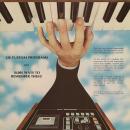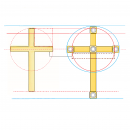Webeando por ahí me he encontrado esta FAQ del antiguo grupo de noticias rec.music.composition. Está escrita en 1994, pero no han pasado los años por ella.
Traduzco los epígrafes de la información que merece la pena considerar incluir en una consulta:
1) Nivel de experiencia.
2) Fuentes de información consultadas hasta el momento.
3) Equipamiento actual.
4) ¿Qué se pretende conseguir?
5) Presupuesto.
Yo sólo añadiría un consejo más: elige para el hilo un título descriptivo para atraer a los usuarios que conozcan el tema. Títulos genéricos como
"¡¡¡Ayuda!!!"
"No me funciona"
"Tengo un problema"
"Urgente"
invitan a salir corriendo y no abrir el hilo, porque muestran que el usuario que los ha creado no es capaz de plantear sus dudas de forma concisa y eficaz. Buenos ejemplos serían cosas como:
"No sé hacer sonar Kontakt en Cubase"
"¿Dónde comprar repuestos para teclados Yamaha?"
Traduzco los epígrafes de la información que merece la pena considerar incluir en una consulta:
1) Nivel de experiencia.
2) Fuentes de información consultadas hasta el momento.
3) Equipamiento actual.
4) ¿Qué se pretende conseguir?
5) Presupuesto.
Yo sólo añadiría un consejo más: elige para el hilo un título descriptivo para atraer a los usuarios que conozcan el tema. Títulos genéricos como
"¡¡¡Ayuda!!!"
"No me funciona"
"Tengo un problema"
"Urgente"
invitan a salir corriendo y no abrir el hilo, porque muestran que el usuario que los ha creado no es capaz de plantear sus dudas de forma concisa y eficaz. Buenos ejemplos serían cosas como:
"No sé hacer sonar Kontakt en Cubase"
"¿Dónde comprar repuestos para teclados Yamaha?"
Alguien escribió:From: Karl Haberl (khaberl@bbn.com)
Date: Mon, 17 Aug 92
"The Beginner's Guide to Asking the Net Gods for [Musical] Advice"
The net can be a powerful resource for information and advice, as
well as being a lively and sometimes fun-filled forum for the exchange
of views. One of the most common mistakes beginners make when asking
for advice is that they do not put enough information in their posts
to allow a more experienced "net veteran" to provide a concise,
focused reply to their request. Questions like "Which keyboard is best
X or Y ?" can only really be answered in the context of knowing
something about the individual who is asking the question.
Below are some suggestions for info that would be helpful to
include in any articles requesting advice on various topics. By
including this info in your post, you will be accomplishing two
important things: (1) you will be explicitly demonstrating to the net
community that you are not lazy, and that you have taken some time
yourself to think about the subject and identify the precise areas
where you need help, and (2) you will be providing essential
background info that will help focus and tailor any responses to your
particular problem. Here, then are the categories (feel free to
augment these with any other information that you think might be
appropriate):
(1) EXPERIENCE LEVEL -
Indicate how much experience you have that is appropriate for
the subject.
This will help focus advice at the right level of detail.
"I've played classical piano for twelve years, never touched a synth."
"I've been using Vision for two years now, and while I would not call
myself a power user, I think I am quite competent with basic
operations."
(2) INFORMATION SOURCES ALREADY EXPLORED -
Asking basic questions without indicating what kind of reading
or other investigations you may have already done yourself is likely
to cause one of two things to happen: either the reader will skip over
your message completely, or will fire off a response like "pick up
Keyboard and Electronic Musician, and get a copy of Mix Bookshelf."
Tell the net what sources of info you have tried - this gives a
baseline for giving advice and/or suggesting further sources of info.
"I read the Buyer's Guide issue of Keyboard."
"I have Anderton's recording book, but I still don't understand
reverb."
"I've only talked to my local salesman about this, he says ..."
(3) CURRENT EQUIPMENT CONFIGURATION -
With equipment-related questions, it is helpful for the
respondent to know how any suggested new equipment will complement an
existing setup.
"I own two rusty cans and 100 yds of twine."
"I own a JX-3P, M1, and D70 for synths, and a Tascam PortaPotty
4-track."
(4) WHAT YOU WANT TO ACCOMPLISH -
Defining what your particular goals are is *critical* for any
respondent to give personalized advice. Besides, goal-definition also
happens to be the most critical activity that *you* can do to focus
your search through the the maze of information and equipment that is
out there.
"I want to just have fun in my basement studio, writing pop tunes
for my own enjoyment and distributing them to my friends."
"I want to write soundtracks for local TV productions."
"I want to produce demo tapes of my band and send them to record
companies."
"I want to optimize my rig for live performance of industrial music."
(5) BUDGET -
For most of the people on this planet, budget is a key
constraint. If you have a precise figure in mind, give it. If you're
trying to get a more general sense of what things cost versus their
capabilities, that's O.K. too, but you should still be able to
provide a *range* of $$ figures that you would be willing to consider.
Obviously, defining your budget goal will help respondents restrict
the range of products considered and discussed. And if you're close
to a boundary, they will often say "of course, with just $X more you
could step up to a ..."
"I have between $300-500 bucks to spend on a reverb unit."
"I am willing to spend up to $2000 on a new keyboard if it will
allow me to do X,Y, and Z; but I'd prefer to keep it under
$1500."








 perfectamente expresado...
perfectamente expresado... 








